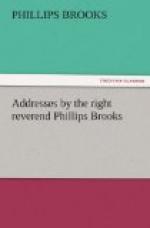for him. I know of no definition of liberty,
that oldest and dearest phrase of men, and sometimes
the vaguest also, except that. It has been perverted,
it has been distorted and mystified, but that is what
it really means: the fullest opportunity for
a man to do and be the very best that is in his personal
nature to do and to be. It immediately follows
that everything which is necessary for the full realization
of a man’s life, even though it seems to have
the character of restraint for a moment, is really
a part of the process of his enfranchisement, is the
bringing forth of him to a fuller liberty. You
see a man coming forward and offering himself as one
of the defenders of his country in his country’s
need. You see him standing at the door where
men are being received as recruits into the army of
the country. He wants liberty. He wants to
be able to do that which he cannot do in his poor,
personal isolation here at home. He wants the
badge which will give him the right to go forth and
meet the enemies of his country, and he enrolls himself
among these men. He makes himself subject to
obligations, duties, and drill. They are a part
of his enfranchisement. They are really the breaking
of the fetters upon his slavery, the sending him forth
into freedom. He is like a bit of iron or steel
that lies upon the ground. It lies neglected and
perfectly free. You see it is made by the adjustment
of the end of it so that it can be set into a great
machine and become part of a great working system.
But there it lies. Will you call it free?
It is bound to be nothing there. It is absolutely
separate, and with its own personality distinct and
individual and all alone. What is to make that
bit of iron a free bit of iron, to let it go forth
and do the thing which it was meant to do, but the
taking of it and the binding of it at both ends into
the structure of which it was made to be a part?
It seems to me the binding of a man,—it
seems to me that the binding of the iron is not the
yielding of its freedom. It is not merely after
finding its place within the system that it first
achieves its freedom and so joins in the music and
partakes of the courses with which the whole enginery
is filled. Is not it, then, for the first time
a free bit of iron, having accomplished all that it
was made to do when it came forth from the forge of
the master, who had this purpose in his mind?
This, then, is freedom; everything is part of the
enfranchisement of a man which helps to put him in
the place where he can live his best. Therefore
every duty, every will of God, every commandment of
Christ, every self-surrender that a man is called
upon to obey or to make—do not think of
it as if it were simply a restraint to liberty, but
think of it as the very means of freedom, by which
we realize the very purpose of God and the fulfilment
of our life. It is interesting to see how all
that is true in regard to the matter of belief, doctrine,
and opinions which we are apt to accept. How




